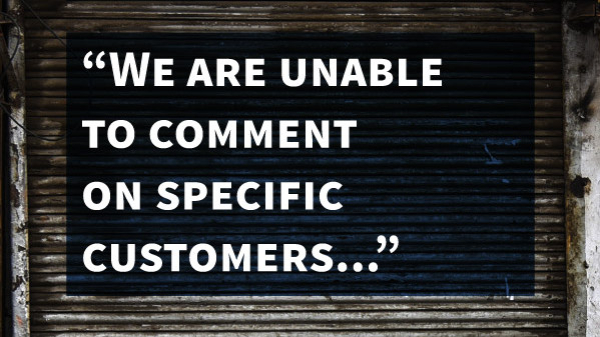World’s biggest banks routinely hide links to human rights and environmental abuses behind client confidentiality – study
Ryan Brightwell, researcher and editor: ryan@banktrack.org

Ryan Brightwell, researcher and editor: ryan@banktrack.org
Some of the world’s biggest banks are routinely hiding behind client confidentiality to conceal investments in companies and projects that infringe human and environmental rights, the first study of its kind reveals today.
BankTrack, which campaigns to hold commercial banks accountable, today publishes analysis of five years of correspondence with 31 major international banks regarding problematic projects they finance. It finds that in nearly half of all responses (70 of 150), banks said they could not comment on whether they had a relationship with a particular customer or project. Half of those responses cited client confidentiality as the reason.
The study also finds no legal obstacles to banks disclosing information about their clients in high-risk industries like mining, oil and gas or palm oil, provided they obtain client consent. In almost all major banking centres, client confidentiality is written into bank contracts but is not a statutory requirement. Even where it is, in countries such as Switzerland and Singapore, the report finds disclosure is clearly possible with client consent.
“When big banks hide links to companies that use child labour, trash rainforests or displace indigenous people, they make accountability for those abuses impossible. Banks routinely claim that they are prevented from disclosing their finance for these companies, but we’ve found that this is a choice banks make. It doesn’t have to be this way. Banks can – and do – write the right to disclose into their contracts when it suits their interests. They must do so when it comes to basic human rights,” said Johan Frijns, Director at BankTrack.
In BankTrack’s analysis, HSBC was the bank found most often to cite client confidentiality as an obstacle to disclosing its clients, representing a total of 7 per cent of all responses audited (11 of 150). The research finds that banks based in the UK, Canada and Asia are the least likely to disclose their clients, with those in mainland Europe the most transparent. Transparency varies significantly across banks in both the USA and Australia.
The findings of the report point to the huge importance of transparency commitments being part and parcel of every sustainability commitment. The ongoing revision of the Equator Principles, a risk management framework adopted by financial institutions to assess and manage environmental and social risk, and UN’s Principles for Responsible Banking, which are currently being drafted, both provide opportunity for the banking sector to strengthen such commitments.
“Victims cannot engage with the banks backing companies that have abused them if those banks will not even confirm whether they are involved. More transparency is critical if industry standards to assess and manage environmental and social risk are to function. As revision of the Equator Principles is currently underway, banks have the opportunity to affect a step change in transparency by making public disclosure of all transactions a condition of all their future lending,” said Johan Frijns.
Responding to the report’s findings, Christian Donaldson, IFI Economic Justice Policy Advisor at Oxfam, said: “Development finance is increasingly being delivered via financial intermediaries such as commercial banks. For vulnerable and marginalized communities, the need for transparency and disclosure of such transactions including project-related information is real and urgent. But bank confidentiality practices represent the first major challenge to this approach for development finance. In Oxfam’s view, it is an impossible situation for the banks to make sustainability and human rights commitments and then fail to provide the necessary and relevant information for these commitments to be assessed or monitored in practice by communities, investors, or CSOs alike.”
Notes to editors:
-
The briefing paper, "We are unable to comment on specific customers...", Challenging banks on client confidentiality, can be downloaded here.
-
The analysis in the report is based on a database of 150 pieces of correspondence BankTrack received from 31 large international banks, in response to their enquiries, between 2012 and 2017.
-
The paper and its recommendations are endorsed by: Accountability Counsel, Australasian Centre for Corporate Responsibility (ACCR), Bank Information Center Europe, CEE Bankwatch Network, Conectas, The Centre for Research on Multinational Corporations (SOMO), Fair Finance Guide International, Facing Finance, Les Amis de la Terre France, Oxfam, PAX, Public Eye, Rainforest Action Network and Share Action.
